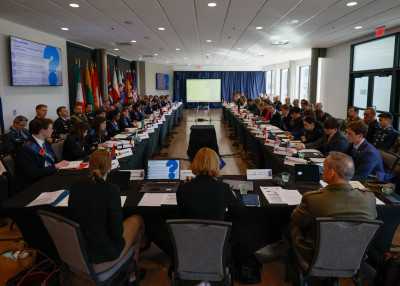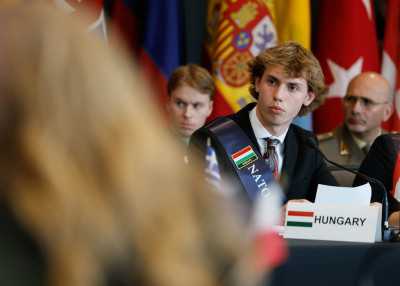Model NATO Challenge 2025 – preparing diplomats of the future
Text: NATO Allied Command Transformation | Photo: NATO ACT | 14:30 April 23, 2025How does a NATO ambassador think in the midst of a crisis situation? What does it mean to represent national interests in an international alliance? The high school students participating in the Model NATO Challenge 2025 simulation exercise – which was organized by the NATO Allied Command Transformation in cooperation with Virginia Wesleyan University on 28 March – received answers to these questions, too.

The Norfolk-based NATO Allied Command Transformation has organized Model NATO Challenge simulation exercise since 2007 by involving the National Liaison Offices of NATO member states. This year, the event provided 32 high school students with the opportunity to learn about the workings of the North Atlantic Council (NAC), the highest political decision-making body within NATO. The roles of leading NATO officials, the NATO Secretary General and the Chief of the NATO Military Committee were played by the staff of NATO ACT, while the American students represented the chosen NATO member states as ambassadors.
Hungary was represented by Austin Stegerwald, a 11th-form American high school student, whose preparation was led by ACT Concept Development Manager Erika Gazdag.

This year’s simulation exercise focused on security issues of strategic significance in the Sahel, an area also important to Hungary, with special regard to migration, terrorism and climate change. The scenario modelling NATO’s crisis response exercise was aimed at ensuring that the students acting as ambassadors not only learn about ongoing crises in the region but also recognize the regional and global connections of the crises. The participants were tasked to deal with crisis situations in their national scope, present the member states’ approaches and national interests, and propose creative allied solutions to the simulated crisis. Like in reality, the NAC session was characterized by active dialogue, the simultaneous presentation of various perspectives and the difficulties in working out collective solutions. The exercise planners paid great attention to realistically introducing the crisis situations, as well as to assisting the situation awareness of those acting as ambassadors and the preparation of decision proposals. The expert preparing the student (the office of the national representative in Norfolk) helped the Hungary-specific training of the student acting as the Hungarian NATO ambassador and the development of convincing Hungarian positions and proposals.
The Model NATO Challenge simulation task had outstanding significance from a methodological point of view as well. During the preparation, the participants learnt about the chosen country, the international policies connected with the Sahel, the national interests pursued in the region, the possibilities of bilateral and multilateral cooperation as well as the channeling of proposals into NATO’s decision-making process. While exercising, they acquired strategic thinking skills, quick and effective decision-making and the development of international cooperation. These experiences can be utilized in training the personnel of the Hungarian Defence Forces preparing for permanent NATO positions, in military tertiary education and also contribute to the dissemination of knowledge of global crisis management and diplomacy on a wide scale.